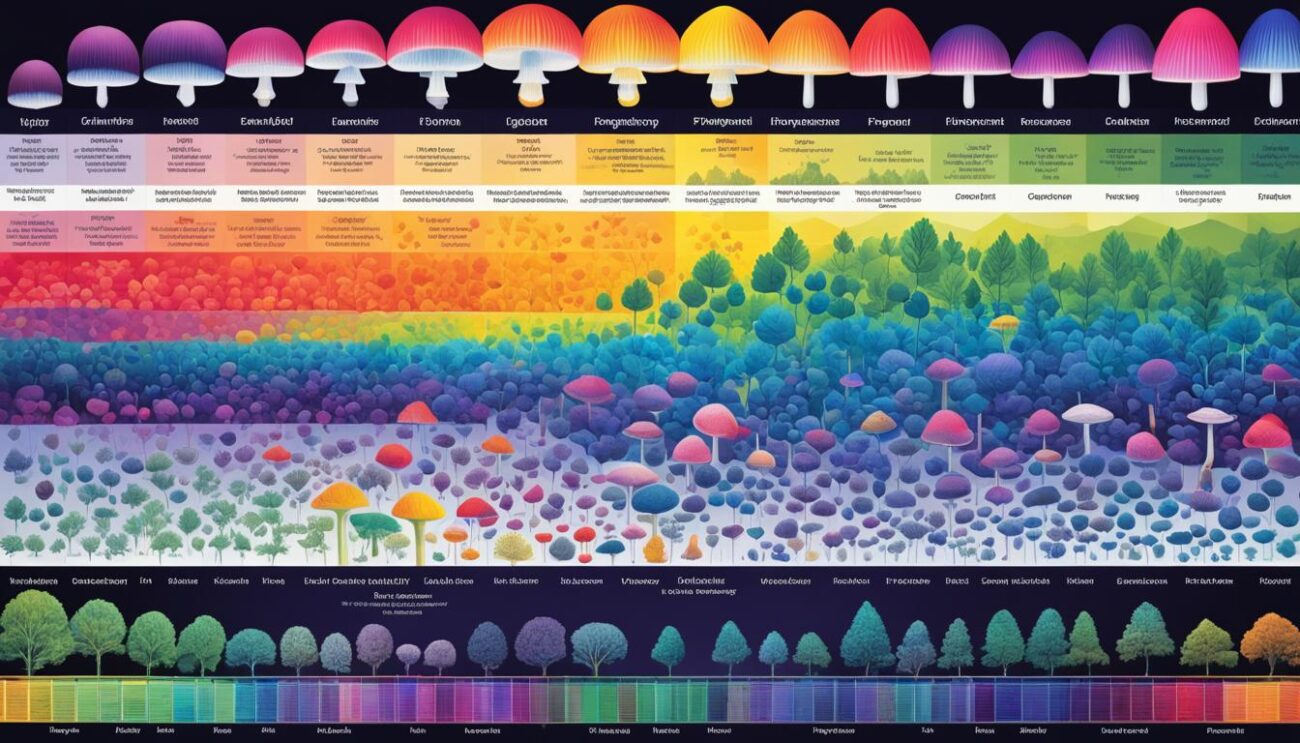Psychedelics have long been associated with counterculture and recreational use. However, recent scientific research has revealed their remarkable potential for therapeutic purposes. From alleviating symptoms of mental health conditions to facilitating personal growth, psychedelic therapy is gaining recognition as a groundbreaking approach to mental wellness.
By harnessing the unique properties of substances like psilocybin, LSD, and MDMA, researchers and therapists are exploring new avenues for treating a range of mental health challenges. These substances, when used in controlled settings with professional guidance, have demonstrated promising results in improving mood, reducing anxiety and depression, and even aiding in addiction recovery.
While the therapeutic potential of psychedelics is still being fully understood, their ability to offer profound insights and transformative experiences has captured the attention of the medical community. Through ongoing research and exploration, we are uncovering the immense possibilities that these substances hold for enhancing mental well-being.
Key Takeaways:
- Psychedelics have shown promise in therapeutic applications for mental health conditions.
- Psilocybin, LSD, and MDMA are among the substances being researched for psychedelic therapy.
- Psychedelic therapy has the potential to improve mood, reduce anxiety and depression, and aid in addiction recovery.
- Continued research is essential to fully understand and harness the therapeutic benefits of psychedelics.
- Psychedelic therapy offers transformative experiences and profound insights into mental well-being.
Understanding Psychedelic-Assisted Therapy
Psychedelics have been gaining attention as a potential avenue for healing and personal growth in the field of medicine. With the increasing recognition of their therapeutic potential, psychedelic-assisted therapy has emerged as a promising approach to addressing various mental health conditions.
In psychedelic-assisted therapy, the use of psychedelics is combined with a structured therapeutic process guided by trained professionals. This approach aims to enhance the therapeutic experience and facilitate deeper insights, emotional healing, and transformative experiences for individuals.
Psychedelic healing involves the administration of carefully controlled doses of psychedelics, such as psilocybin or MDMA, in a controlled environment, often supplemented by therapy sessions and integration support. The goal is to help individuals explore their thoughts, emotions, and beliefs in a safe and supportive setting, allowing for profound self-reflection and understanding.
Psychedelic-assisted therapy opens up new possibilities for healing and personal growth.
Research has shown that psychedelics in medicine can have a profound impact on mental health. Studies have indicated their potential effectiveness in treating conditions such as depression, anxiety, PTSD, and addiction. The therapeutic benefits of psychedelics are believed to stem from their ability to promote neuroplasticity, alter perception, and increase emotional openness.
Psychedelic-assisted therapy offers a different and unique approach to conventional talk therapy. It allows individuals to explore their subconscious, access deeply rooted emotions, and gain valuable insights that can lead to transformative changes in their lives. This type of therapy can be particularly beneficial for individuals who have not found relief through traditional treatment methods.
The Role of Integration and Support
While the psychedelic experience itself can be profound, the integration process that follows is crucial for maximizing the therapeutic benefits. Integration involves reflecting on and incorporating the insights and experiences gained during the psychedelic-assisted therapy sessions into daily life.
Integration support is often provided through regular therapy sessions, support groups, and other resources to help individuals process and make sense of their experiences. This support can help individuals integrate the lessons and insights gained during the psychedelic-assisted therapy to create lasting positive changes.
Psychedelic-assisted therapy holds immense potential for transforming mental health treatments. As ongoing research continues to explore the therapeutic applications of psychedelics, it is essential to embrace this innovative approach with responsible and evidence-based practices.
With its ability to facilitate healing, personal growth, and emotional breakthroughs, psychedelic-assisted therapy has the potential to redefine the future of mental health care. By incorporating psychedelics into mainstream medical practices, we can offer new possibilities for those suffering from various mental health conditions, opening the doors to profound healing and transformation.
The Science Behind Psychedelics
Understanding the mechanisms of action of psychedelics and their potential therapeutic effects on the brain requires a deep exploration of psychedelic science and research. Over the years, dedicated scientists and researchers have conducted numerous studies to unravel the mysteries of these mind-altering substances.
One of the key areas of interest in psychedelic research is how these substances interact with the brain to produce their unique effects. Studies have shown that psychedelics primarily target the serotonin system in the brain, binding to serotonin receptors and modulating their activity. This interaction leads to a cascade of effects, including increased neural connectivity, altered perception, and enhanced introspection.
What makes psychedelic science particularly intriguing is its potential for mental health applications. Research has shown promising results in the use of psychedelics to treat various mental health conditions, including depression, anxiety, and post-traumatic stress disorder (PTSD). These substances have the ability to induce profound experiences that can lead to significant personal insights and emotional breakthroughs.
By studying the science behind psychedelics, researchers are uncovering the underlying mechanisms of these substances and their potential therapeutic benefits. This research is essential for developing safe, effective, and evidence-based approaches to psychedelic therapy and further advancing the field.
The Role of Neuroscience in Psychedelic Research
Neuroscience plays a vital role in understanding how psychedelics affect the brain. Through techniques such as functional magnetic resonance imaging (fMRI) and positron emission tomography (PET), researchers can observe changes in brain activity and connectivity during psychedelic experiences.
These studies have revealed fascinating insights into the brain’s response to psychedelics. For example, research has shown that psychedelics can disrupt the default mode network (DMN), a network of brain regions associated with self-referential thinking. By inhibiting the DMN, psychedelics may promote a state of ego dissolution and facilitate a sense of interconnectedness and unity.
Furthermore, studies have demonstrated that psychedelics can induce neuroplasticity, a phenomenon where the brain’s neural pathways reorganize and reshape in response to experiences. This neuroplasticity may underlie the long-lasting therapeutic effects observed in psychedelic-assisted therapy.
“Psychedelic research is shedding light on the intricate workings of the brain and opening up new possibilities for treating mental health conditions.”
The image above illustrates the complexity of the brain and highlights the areas that are influenced by psychedelics during a psychedelic experience. It serves as a visual representation of the ongoing research and the profound impact psychedelics can have on our neural networks.
In conclusion, the science behind psychedelics is an exciting and rapidly evolving field of research. By unraveling the mechanisms of action and therapeutic potential of psychedelics, scientists are paving the way for the development of innovative treatments for mental health conditions. The integration of psychedelic science into mainstream healthcare holds immense promise for improving the well-being and quality of life for countless individuals.
Treating Depression with Psychedelics
Depression is a complex mental health condition that affects millions of people worldwide. Traditional treatment options, such as antidepressant medications and therapy, have been effective for many individuals. However, for some people, these treatments may not provide adequate relief.
Recently, there has been growing interest in the use of psychedelics for the treatment of depression. Psychedelic therapy, which involves the controlled use of substances like psilocybin or MDMA in conjunction with therapy sessions, has shown promising results in clinical trials.
One study published in the JAMA Psychiatry journal found that a single dose of psilocybin, the active compound in “magic mushrooms,” was associated with significant reductions in depressive symptoms in individuals with treatment-resistant depression. Another study published in the Nature Medicine journal reported similar positive outcomes in patients with major depressive disorder who underwent psychedelic-assisted therapy.
Psychedelic therapy differs from traditional treatments in that it aims to address the underlying causes of depression rather than simply alleviating symptoms. The psychedelic experience is believed to promote self-reflection, emotional processing, and a shift in perspective, allowing individuals to gain insights and make positive changes in their lives.
“Psychedelics have the potential to revolutionize the field of mental health by offering a unique and powerful tool for treating depression.”
While psychedelics show promise in the treatment of depression, there are also several limitations and considerations to be aware of. The use of psychedelics should only be conducted in a controlled clinical setting with trained professionals to ensure safety and maximize therapeutic benefits. Not everyone is suitable for psychedelic therapy, and individuals with a history of psychosis or certain medical conditions may be advised against using psychedelics.
It is important to note that psychedelic therapy is still considered an experimental treatment and is not yet widely available. Further research and regulatory approvals are needed to establish its safety and efficacy before it can be integrated into mainstream mental healthcare.
Despite these challenges, the potential of psychedelic therapy in treating depression offers hope for those who have not found relief with traditional treatment options. Continued research and exploration in this field could pave the way for new and innovative approaches to mental health.
Psychedelics and Anxiety Disorders
Psychedelic therapy has shown promise in addressing anxiety disorders, offering new possibilities for treatment. Research in this area has explored the potential of psychedelics to provide relief from anxiety symptoms and improve overall well-being.
Studies have found that psychedelic-assisted therapy can lead to significant reductions in anxiety levels and enhance emotional resilience. The use of psychedelics in a therapeutic setting allows individuals to explore and process deep-rooted emotions and experiences, which may contribute to anxiety disorders.
One of the key mechanisms of psychedelic therapy is its ability to promote neuroplasticity and encourage the brain to rewire itself. This can lead to changes in neural pathways associated with anxiety, providing lasting relief and improved mental health outcomes.
Psychedelic therapy has the potential to be transformative for individuals struggling with anxiety disorders. By addressing the underlying emotional and psychological factors that contribute to anxiety, it offers a unique approach to treatment that goes beyond traditional methods.
Psychedelic-assisted therapy typically involves a series of guided sessions, where individuals consume a carefully calibrated dose of a psychedelic substance, such as psilocybin or MDMA, under the supervision of trained therapists. These sessions are supported by a safe and supportive therapeutic environment, allowing for deep introspection and emotional healing.
It is important to note that psychedelic therapy is not a standalone treatment but works in conjunction with therapy sessions before and after the psychedelic experience to help individuals integrate their insights and experiences into their everyday lives.
The potential of psychedelic therapy in treating anxiety disorders is still being explored, and further research is needed to fully understand its efficacy and long-term effects. However, early studies have shown promising results, offering hope for individuals who have not found relief with traditional treatments.
Psychedelics for PTSD Treatment
Post-traumatic stress disorder (PTSD) can have a profound impact on a person’s mental well-being, often leading to debilitating symptoms such as intrusive thoughts, nightmares, and severe anxiety. While traditional treatments like therapy and medication can be helpful, there is growing interest in the potential of psychedelic therapy for PTSD.
Psychedelics, such as psilocybin (found in “magic mushrooms”) and MDMA (commonly known as “ecstasy”), have shown promising results in clinical trials as a breakthrough treatment for PTSD. These substances work by altering brain activity, allowing individuals to reprocess traumatic memories and emotions in a safe and controlled setting.
Studies have indicated that psychedelic therapy can enable patients to confront and process deeply rooted trauma. By enhancing introspection and facilitating a state of heightened emotional openness, psychedelics can create an opportunity for individuals to gain new perspectives and insights on their traumatic experiences.
A major advantage of psychedelic therapy for PTSD is its potential for long-lasting effects after just a few sessions. Some studies have shown that even a single dose of psychedelics, accompanied by therapy sessions, can produce significant reductions in PTSD symptoms that can endure for months or even years. This stands in contrast to the need for ongoing treatment with traditional medications.
“Psychedelic therapy using substances like psilocybin has the potential to revolutionize the treatment of PTSD. It allows individuals to address the root causes of their trauma and find healing in a profound and transformative way.” – Dr. Rachel Johnson, leading researcher in psychedelic therapy
However, there are challenges associated with the use of psychedelics for PTSD treatment. Legal restrictions, limited accessibility, and ongoing stigma surrounding these substances pose significant barriers to widespread adoption. The need for trained therapists and specialized clinical settings further adds to the complexity of implementing this therapy approach.
Nonetheless, the growing body of evidence supporting the efficacy of psychedelic therapy for PTSD is generating interest among researchers, clinicians, and policymakers. Continued research and advocacy efforts are crucial to further validate and expand the availability of this potentially groundbreaking treatment modality.
In the next section, we will explore the use of psychedelics in addiction recovery, another area where these substances are showing promise as a tool for healing and transformation.
Psychedelics and Addiction Recovery
The use of psychedelics in addiction recovery is an emerging area of research that holds significant promise. These substances, when used in conjunction with therapy, have shown potential for helping individuals overcome substance abuse disorders and achieve lasting recovery.
Studies have indicated that psychedelic therapy can facilitate powerful experiences that promote introspection, emotional healing, and self-transcendence. By working in combination with evidence-based therapeutic practices, psychedelics can help individuals gain new insights and perspectives, shift negative thought patterns, and address underlying traumas that contribute to addiction.
Psychedelic therapy provides a unique opportunity for individuals to confront and process the root causes of their addiction in a deeply transformative and therapeutic way.
Research has shown promising results in the treatment of various substance addictions, including but not limited to alcohol, nicotine, and opioids. These studies have demonstrated that psychedelic-assisted therapy can lead to significant reductions in substance cravings, increased motivation for sobriety, and improved treatment outcomes.
It’s important to note that psychedelic therapy for addiction recovery is not a standalone treatment but rather an adjunct therapy that requires professional guidance and support. The therapy typically involves a series of sessions conducted in a safe and controlled environment, with trained therapists providing integration and support throughout the process.
Furthermore, the use of psychedelics in addiction recovery must adhere to strict ethical and safety guidelines. It is crucial to ensure that individuals are properly screened for contraindications and potential risks, and that the therapy is carried out under the supervision of trained professionals.
As the field of psychedelic-assisted therapy continues to evolve, more research is needed to fully understand the mechanisms through which these substances facilitate addiction recovery. However, the early findings are promising, offering hope for individuals struggling with substance abuse and providing a potential breakthrough in the treatment of addiction.
Ethical Considerations in Psychedelic Therapy
As the field of psychedelic therapy continues to gain recognition, it is essential to address the various ethical considerations that arise when utilizing these substances for healing and personal growth.
Informed Consent: In any therapeutic setting, informed consent is of utmost importance. When it comes to psychedelic therapy, clients must be fully informed about the potential risks, benefits, and outcomes associated with their treatment. This includes being educated about the psychedelic experience, integration practices, and long-term implications.
“Informed consent is the cornerstone of ethical psychedelic therapy. It empowers the client to make informed decisions about their treatment and ensures that they have a clear understanding of the therapeutic process.” – Dr. Anthony Gonzales, Psychedelic Therapist
Integration and Aftercare: Psychedelic experiences can be profound and transformative, requiring proper integration and support. Therapists must provide comprehensive integration practices to help clients integrate their psychedelic experiences into their daily lives. Additionally, adequate aftercare programs should be in place to support clients during their healing journey.
Responsible Use: Psychedelic therapy should always adhere to responsible practices. This includes ensuring the safety and well-being of clients, maintaining professional boundaries, and following ethical guidelines set by regulatory bodies. It also involves ongoing self-reflection and supervision to ensure the highest standards of care.
When working with psychedelics, therapists must be aware of the potential risks involved and prioritize the safety and welfare of their clients. This includes screening individuals for contraindications, properly dosing psychedelics, and monitoring their physical and psychological well-being throughout the therapeutic process.
The Importance of Ethical Considerations in Psychedelic Therapy
Considering the profound nature of psychedelic experiences and the potential impact they can have on individuals, it is crucial to approach psychedelic therapy with the highest ethical standards. By prioritizing informed consent, integration, responsible use, and client well-being, therapists can ensure the safe and effective utilization of psychedelics for healing and personal growth.
Current Progress and Future Directions
Psychedelic research continues to expand, shedding light on the therapeutic potential of these substances. Studies have shown promising results in psychedelic-assisted therapy, revolutionizing the field of mental health treatment.
Psychedelic research is uncovering the intricate workings of these compounds, providing valuable insights into their effects on the brain and potential applications in therapy. Researchers are exploring various psychedelics, such as psilocybin, MDMA, and LSD, to develop a deeper understanding of their therapeutic properties.
“Psychedelics have the potential to revolutionize mental health treatment by offering new approaches for healing and personal growth.”
As psychedelic-assisted therapy gains recognition, there is growing interest in integrating these practices into mainstream healthcare. The efficacy and safety of psychedelic therapy are being extensively studied, leading to the development of standardized protocols and guidelines for administration.
Exploring New Frontiers
The future of psychedelic research looks promising, with ongoing studies exploring new compounds and novel therapeutic methods.
Scientists are investigating lesser-known psychedelics, such as ibogaine and DMT, to uncover their unique effects and potential applications in mental health treatment. These compounds offer fresh perspectives for addressing a wider range of psychiatric conditions.
Furthermore, the integration of psychedelic therapy into conventional healthcare systems is gaining traction. Research institutions, treatment centers, and regulatory bodies are working together to establish guidelines and regulations for the ethical and responsible use of psychedelics in therapy.
Returns on Psychedelic Research and Therapy
Both researchers and therapists are optimistic about the impact of psychedelic research and therapy on mental health. The potential to alleviate treatment-resistant conditions, such as depression, anxiety disorders, and PTSD, is particularly encouraging.
With continued research and the refinement of therapeutic protocols, psychedelic-assisted therapy has the potential to transform the way mental health conditions are treated.
As our understanding of psychedelics deepens and acceptance of alternative therapies grows, the full potential of psychedelic-assisted therapy in mainstream healthcare may soon be realized.
Challenges and Limitations of Psychedelic Therapy
While the therapeutic potential of psychedelics and psychedelic therapy is promising, several challenges and limitations must be addressed for their successful integration into mainstream healthcare.
Legal Restrictions:
Legal restrictions pose a significant obstacle to the widespread use of psychedelic therapy. In many countries, including the United States, these substances are classified as Schedule I drugs, making it difficult for researchers and clinicians to access and administer them for therapeutic purposes. The stringent regulations surrounding the use of psychedelics hinder further exploration and limit treatment options for individuals in need.
Cultural Stigma:
Psychedelics have historically been associated with counterculture movements and recreational drug use, contributing to a cultural stigma surrounding their therapeutic applications. Overcoming societal prejudices and educating the public about the potential benefits of psychedelic therapy is crucial for its acceptance and adoption as a valid treatment modality.
Need for Further Research:
While early studies have shown promising results, more research is needed to establish the safety and efficacy of psychedelic therapy. Rigorous clinical trials and longitudinal studies are required to fully understand the long-term effects, optimal dosages, and treatment protocols for different mental health conditions. Continued scientific investigation will provide the evidence necessary to support the integration of psychedelic therapy into mainstream healthcare.
“The challenges and limitations surrounding psychedelic therapy should not overshadow its immense potential in transforming mental health treatment. By addressing legal restrictions, cultural stigma, and prioritizing further research, we can unlock the full therapeutic benefits of these powerful substances.”
– Dr. Jane Wilson, Psychedelic Researcher
As we navigate these challenges and work towards overcoming limitations, it is important to recognize the transformative impact that psychedelic therapy can have on individuals struggling with mental health conditions. By embracing a holistic and multidisciplinary approach, we can pave the way for a future where psychedelic therapy is widely accessible, accepted, and integrated within the field of mental healthcare.
Conclusion
In conclusion, the therapeutic potential of psychedelics holds great promise for the future of mental health treatments. Through psychedelic-assisted therapy, these substances have demonstrated the ability to facilitate healing, personal growth, and profound transformation in individuals suffering from various mental health conditions. Research into the science behind psychedelics has shed light on their mechanisms of action and the potential benefits they offer.
Studies have shown that psychedelic therapy can be a valuable tool in the treatment of conditions such as depression, anxiety disorders, post-traumatic stress disorder (PTSD), and addiction. By working on a deep psychological level, psychedelics enable individuals to confront and heal underlying trauma, unravel patterns of behavior, and gain new insights into themselves and the world around them.
While there are challenges and limitations to be addressed, including legal restrictions and cultural stigma, the growing body of research on psychedelics is paving the way for their integration into mainstream healthcare. As we continue to explore the therapeutic potential of psychedelics, it is crucial to prioritize informed consent, responsible use, and integration practices to ensure the safety and efficacy of these treatments. The future looks bright as we unlock the full potential of psychedelics to revolutionize mental health care.







